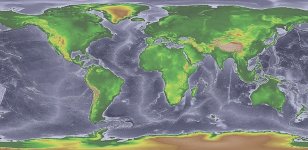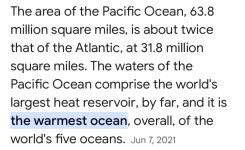It's Climate Change I tell'ya!! IT'S CLIMATE CHANGE!!
- Thread starter B00Mer
- Start date
You are using an out of date browser. It may not display this or other websites correctly.
You should upgrade or use an alternative browser.
You should upgrade or use an alternative browser.
I’ve got a weird question. I’m not trying to be deliberately obtuse here either.
(I know that approximately 12,000 years ago the ocean levels (plural) we’re approximately 400 feet lower than they are now. Florida was big and fat, the Bering land bridge was actually a chunk of ground bigger than what’s now Alaska, same thing in Indonesia, England was part of Europe, etc…)
 ‘The ocean is overflowing’: UN chief issues global SOS as new reports warn Pacific sea-level rise outstrips global average’ is the headline.
‘The ocean is overflowing’: UN chief issues global SOS as new reports warn Pacific sea-level rise outstrips global average’ is the headline.

 apple.news
How is the “Pacific” sea-level rise outstripping the global average? This is an actual serious question.
apple.news
How is the “Pacific” sea-level rise outstripping the global average? This is an actual serious question.
With all the oceans connected, wouldn’t they all rise or lower proportionately, simultaneously, right? Not some faster or slower than others or some not at all or whatever….But all up or down at the same time, depending on global ice levels or lack there of?
UN Secretary-General Antonio Guterres issued a global SOS – “Save Our Seas” – from the Pacific Island nation of Tonga on Tuesday with a plea to the world to “massively increase finance and support for vulnerable countries” in grave danger of the human-caused climate crisis, etc…

Everywhere, every continent and every island anywhere that connects to the ocean…will have a portion of its elevation at 0 feet or meters where it meets the water.
I’ve vacationed in Veradero a few times, & it’s not far above sea level. Google says 9m & maybe that’s an average (?) but most of it is not 9 m above the ocean….

Sea surface temperatures in the Southwest Pacific have risen three times faster than the global average since 1980, according to the World Meteorological Organization’s State of the Climate.
And sea levels in the region have risen at almost twice the global average over the past 30 years, it found (???). This ocean heating is boosting sea level rise, as water expands when it heats, and melting ice sheets and glaciers have added to the volume.
Melting glaciers off the land above the level of the ocean, would drain into the ocean eventually potentially & increase the level (sea level). Ice sheets melting though…really shouldn’t have any significant variance on sea level (or the claim of sea levels being plural in this news article).
Ice floats, Ice Sheets float, because their volume is actually larger than the equivalent amount of water which makes it less dense. Anyway, it just isn’t making sense to me about the Pacific rising faster than other bodies of water…
(I know that approximately 12,000 years ago the ocean levels (plural) we’re approximately 400 feet lower than they are now. Florida was big and fat, the Bering land bridge was actually a chunk of ground bigger than what’s now Alaska, same thing in Indonesia, England was part of Europe, etc…)
 ‘The ocean is overflowing’: UN chief issues global SOS as new reports warn Pacific sea-level rise outstrips global average’ is the headline.
‘The ocean is overflowing’: UN chief issues global SOS as new reports warn Pacific sea-level rise outstrips global average’ is the headline.‘The ocean is overflowing’: UN chief issues global SOS as new reports warn Pacific sea-level rise outstrips global average — CNN
A “worldwide catastrophe” is imperiling Pacific Islands and the world must respond to the unprecedented and devastating impacts of rising seas “before it is too late,” the United Nations chief has warned.
With all the oceans connected, wouldn’t they all rise or lower proportionately, simultaneously, right? Not some faster or slower than others or some not at all or whatever….But all up or down at the same time, depending on global ice levels or lack there of?
UN Secretary-General Antonio Guterres issued a global SOS – “Save Our Seas” – from the Pacific Island nation of Tonga on Tuesday with a plea to the world to “massively increase finance and support for vulnerable countries” in grave danger of the human-caused climate crisis, etc…

Everywhere, every continent and every island anywhere that connects to the ocean…will have a portion of its elevation at 0 feet or meters where it meets the water.
I’ve vacationed in Veradero a few times, & it’s not far above sea level. Google says 9m & maybe that’s an average (?) but most of it is not 9 m above the ocean….

Sea surface temperatures in the Southwest Pacific have risen three times faster than the global average since 1980, according to the World Meteorological Organization’s State of the Climate.
And sea levels in the region have risen at almost twice the global average over the past 30 years, it found (???). This ocean heating is boosting sea level rise, as water expands when it heats, and melting ice sheets and glaciers have added to the volume.
Melting glaciers off the land above the level of the ocean, would drain into the ocean eventually potentially & increase the level (sea level). Ice sheets melting though…really shouldn’t have any significant variance on sea level (or the claim of sea levels being plural in this news article).
Ice floats, Ice Sheets float, because their volume is actually larger than the equivalent amount of water which makes it less dense. Anyway, it just isn’t making sense to me about the Pacific rising faster than other bodies of water…
Apparently, the Pacific is the warmest ocean…& also the largest, So that might be the correlation…

??? Even so though you would think that with all those bodies of water being connected (the worlds five oceans), everything would level out against each other in one ocean couldn’t rise faster than the others like what’s being claimed. Maybe it is, but it just feels wrong. How would the below fit into the above claim?

The Atlantic ocean is half the size of the Pacific Ocean roughly…& maybe that’s part of it but…they’re connected…& both stretch across the equator towards both poles…

??? Even so though you would think that with all those bodies of water being connected (the worlds five oceans), everything would level out against each other in one ocean couldn’t rise faster than the others like what’s being claimed. Maybe it is, but it just feels wrong. How would the below fit into the above claim?

The Atlantic ocean is half the size of the Pacific Ocean roughly…& maybe that’s part of it but…they’re connected…& both stretch across the equator towards both poles…
Apparently, the Pacific is the warmest ocean…& also the largest, So that might be the correlation…
View attachment 24344
??? Even so though you would think that with all those bodies of water being connected (the worlds five oceans), everything would level out against each other in one ocean couldn’t rise faster than the others like what’s being claimed. Maybe it is, but it just feels wrong. How would the below fit into the above claim?
View attachment 24345
The Atlantic ocean is half the size of the Pacific Ocean roughly…& maybe that’s part of it but…they’re connected…& both stretch across the equator

South Atlantic Anomaly - Wikipedia

Polar drift - Wikipedia

Swarm probes weakening of Earth’s magnetic field
In an area stretching from Africa to South America, Earth’s magnetic field is gradually weakening. This strange behaviour has geophysicists puzzled and is causing technical disturbances in satellites orbiting Earth. Scientists are using data from ESA’s Swarm constellation to improve our...
www.esa.int
Me loves gefizzix and much as I loves geochemistry.
Ok, so why does that have the UN more concerned about the southwest Pacific rising at triple the rate of the global whatever it is, that they’re claiming sea level wise…the above is all interesting but…?
Miami is low. New York is low, and yes, I realized neither one of these is on the Pacific…Veradero is low, & I haven’t heard of anybody worried about that playground?
Is this a squeaky wheel thing?
Miami is low. New York is low, and yes, I realized neither one of these is on the Pacific…Veradero is low, & I haven’t heard of anybody worried about that playground?
Is this a squeaky wheel thing?
This is the dawning of the Age Of Aquarius.Ok, so why does that have the UN more concerned about the southwest Pacific rising at triple the rate of the global whatever it is, that they’re claiming sea level wise…the above is all interesting but…?
Miami is low. New York is low, and yes, I realized neither one of these is on the Pacific…Veradero is low, & I haven’t heard of anybody worried about that playground?
Is this a squeaky wheel thing?
If we go back to when "climate records" began...70ish years ago...
During the precession, the Earth's axis traces out an imaginary conical surface in space and a circle on the celestial sphere. The Celestial North Pole or CNP (i.e., the projection of the Earth's axis onto the northern sky) moves about 1° along this circle every 72 years (360x72 = 26,000).
1° shift since 1950...on record. It's cooler now than 1° ago. 2° ago was the end of the Little Ice Age
Last edited:
Deadly mosquito virus has Massachusetts towns urging people to stay in at night
Author of the article:Washington Post
Washington Post
Anumita Kaur, The Washington Post
Published Aug 26, 2024 • 3 minute read
082624-Mosquito-Virus-Massachusetts
The town of Plymouth announced Friday, Aug. 23, 2024, that it's closing public outdoor recreation facilities from dusk until dawn each day after a horse in the town was infected with eastern equine encephalitis.
A rare but deadly disease spread by mosquitoes has nearly a dozen Massachusetts communities on alert, prompting some towns to close parks after dusk, restrict outdoor activities and reschedule public events.
Massachusetts health officials this month confirmed the state’s first human case of the eastern equine encephalitis virus this year – a man in his 80s exposed in Worcester County, west of Boston. Ten communities are now designated at high or critical risk for the virus, the health agency said Saturday. Plymouth, about 40 miles south of Boston, closed all public parks and fields from dusk until dawn. Nearby, Oxford banned all outdoor activities on town property after 6 p.m.
“We have not seen an outbreak of EEE for four years in Massachusetts,” Robbie Goldstein, the state’s department of public health commissioner, said in a statement. “We need to use all our available tools to reduce risk and protect our communities. We are asking everyone to do their part.”
Eastern equine encephalitis is caused by a virus spread through the bite of an infected mosquito, according to the Centers for Disease Control and Prevention. It is rare, but serious: about 30 percent of people with the virus die, and many survivors suffer ongoing neurological problems.
The virus outbreak in Massachusetts comes as mosquito season has lengthened across the United States, The Washington Post reported. Climate change has fueled rising global temperatures, and for more than two-thirds of the United States, increased the number of “mosquito days,” meaning days with an average humidity of at least 42 percent and temperatures between 50 and 95 degrees.
The Northeast has warmed faster than the rest of the country and experienced the biggest increase in mosquito days. In Massachusetts, there have been an average of 14 more mosquito days compared with the period from 1980 to 2009.
Scientists warn that longer mosquito seasons could heighten the risk of outbreaks of diseases carried by the bloodsucking insects, such as dengue and malaria.
Massachusetts health officials said there will be mosquito spraying between dusk and dawn throughout this week in Plymouth and Worcester counties to limit the presence of eastern equine encephalitis.
“Aerial spraying will target mosquitoes carrying the EEE virus. While these measures are crucial for reducing transmission risk, it’s vital for everyone to stay vigilant and follow personal protection guidelines to safeguard our community,” Massachusetts Department of Agricultural Resources Commissioner Ashley Randle said in a statement.
Residents are urged to use mosquito repellents, drain standing water around their homes, wear clothing that covers skin, and reschedule outdoor activities to avoid the hours between dusk and dawn.
Symptoms of those infected with the virus can include fever, headache, vomiting, diarrhea, seizures, behavioral changes and drowsiness. There are no vaccines to prevent eastern equine encephalitis, nor is there a specific treatment.
In 2019, there were 12 human cases of the virus in Massachusetts. Six people died. The next year, there were five human cases, with one death, according to the state health agency.
In a Wednesday memo, Oxford’s town manager, Jennifer M. Callahan, said she has been in touch with the family of the person who was afflicted with the virus this year and still battling it in the hospital.
The family “explained their loved one with EEE was the one person in the family who recounted through the years they never get bit by mosquitos,” Callahan said. “However, right before he became symptomatic he shared that he had been recently bitten.”
“They want people to be aware this is an extremely serious disease with terrible physical and emotional consequences, regardless if the person manages to live,” Callahan said.

 torontosun.com
torontosun.com
Author of the article:Washington Post
Washington Post
Anumita Kaur, The Washington Post
Published Aug 26, 2024 • 3 minute read
082624-Mosquito-Virus-Massachusetts
The town of Plymouth announced Friday, Aug. 23, 2024, that it's closing public outdoor recreation facilities from dusk until dawn each day after a horse in the town was infected with eastern equine encephalitis.
A rare but deadly disease spread by mosquitoes has nearly a dozen Massachusetts communities on alert, prompting some towns to close parks after dusk, restrict outdoor activities and reschedule public events.
Massachusetts health officials this month confirmed the state’s first human case of the eastern equine encephalitis virus this year – a man in his 80s exposed in Worcester County, west of Boston. Ten communities are now designated at high or critical risk for the virus, the health agency said Saturday. Plymouth, about 40 miles south of Boston, closed all public parks and fields from dusk until dawn. Nearby, Oxford banned all outdoor activities on town property after 6 p.m.
“We have not seen an outbreak of EEE for four years in Massachusetts,” Robbie Goldstein, the state’s department of public health commissioner, said in a statement. “We need to use all our available tools to reduce risk and protect our communities. We are asking everyone to do their part.”
Eastern equine encephalitis is caused by a virus spread through the bite of an infected mosquito, according to the Centers for Disease Control and Prevention. It is rare, but serious: about 30 percent of people with the virus die, and many survivors suffer ongoing neurological problems.
The virus outbreak in Massachusetts comes as mosquito season has lengthened across the United States, The Washington Post reported. Climate change has fueled rising global temperatures, and for more than two-thirds of the United States, increased the number of “mosquito days,” meaning days with an average humidity of at least 42 percent and temperatures between 50 and 95 degrees.
The Northeast has warmed faster than the rest of the country and experienced the biggest increase in mosquito days. In Massachusetts, there have been an average of 14 more mosquito days compared with the period from 1980 to 2009.
Scientists warn that longer mosquito seasons could heighten the risk of outbreaks of diseases carried by the bloodsucking insects, such as dengue and malaria.
Massachusetts health officials said there will be mosquito spraying between dusk and dawn throughout this week in Plymouth and Worcester counties to limit the presence of eastern equine encephalitis.
“Aerial spraying will target mosquitoes carrying the EEE virus. While these measures are crucial for reducing transmission risk, it’s vital for everyone to stay vigilant and follow personal protection guidelines to safeguard our community,” Massachusetts Department of Agricultural Resources Commissioner Ashley Randle said in a statement.
Residents are urged to use mosquito repellents, drain standing water around their homes, wear clothing that covers skin, and reschedule outdoor activities to avoid the hours between dusk and dawn.
Symptoms of those infected with the virus can include fever, headache, vomiting, diarrhea, seizures, behavioral changes and drowsiness. There are no vaccines to prevent eastern equine encephalitis, nor is there a specific treatment.
In 2019, there were 12 human cases of the virus in Massachusetts. Six people died. The next year, there were five human cases, with one death, according to the state health agency.
In a Wednesday memo, Oxford’s town manager, Jennifer M. Callahan, said she has been in touch with the family of the person who was afflicted with the virus this year and still battling it in the hospital.
The family “explained their loved one with EEE was the one person in the family who recounted through the years they never get bit by mosquitos,” Callahan said. “However, right before he became symptomatic he shared that he had been recently bitten.”
“They want people to be aware this is an extremely serious disease with terrible physical and emotional consequences, regardless if the person manages to live,” Callahan said.

Deadly mosquito virus has Massachusetts towns urging people to stay in at night
The virus outbreak in Massachusetts comes as mosquito season has lengthened across the United States.
Ah, they're lying. The climate is cynical so it's constantly changing. The seas/oceans have risen & fallen for a millennium so why there's concern now is beyond me. I would be more concerned with the pollution in the waters - the plastics etc. not anything else. I'd want to ensure the creatures of the deep are safe & protected instead. That's a bigger concern for me.Ok, so why does that have the UN more concerned about the southwest Pacific rising at triple the rate of the global whatever it is, that they’re claiming sea level wise…the above is all interesting but…?
Miami is low. New York is low, and yes, I realized neither one of these is on the Pacific…Veradero is low, & I haven’t heard of anybody worried about that playground?
Is this a squeaky wheel thing?
I agree , if we spent the time and money on local cleanup and habitat restoration, we would actually see the results . Giving more tax dollars to government never solves anything .Ah, they're lying. The climate is cynical so it's constantly changing. The seas/oceans have risen & fallen for a millennium so why there's concern now is beyond me. I would be more concerned with the pollution in the waters - the plastics etc. not anything else. I'd want to ensure the creatures of the deep are safe & protected instead. That's a bigger concern for me.
Yep, that ol' world-weary climate and its seen-it-all-not-impressed attitude.Ah, they're lying. The climate is cynical so it's constantly changing.
What're ya gonna do?
Over 100 tons of dead fish collect at Greek port after climate-related mass die-off
Author of the article:Associated Press
Associated Press
Vaggelis Kousioras And Derek Gatopoulos
Published Aug 29, 2024 • 1 minute read
082924-APTOPIX-Greece-Dead-Fish
Workers collect dead fish from a river near the port city of Volos, central Greece, Thursday, Aug. 29, 2024, following a mass die-off linked to extreme climate fluctuations. Photo by Vaggelis Kousioras /THE ASSOCIATED PRESS
VOLOS, Greece (AP) — More than 100 tons of dead fish had been collected in and around the port of Volos, in central Greece, following a mass die-off linked to extreme climate fluctuations, authorities said Thursday.
The dead freshwater fish filled the bay, 320 kilometres (200 miles) north of Athens, and nearby rivers after water levels were swollen by floods last year, followed by months of severe drought.
The die-off has hit local businesses along the seafront with commercial activity reduced by 80% in the past three days, according to Volos’s Chamber of Commerce.
Fishing trawlers have been chartered by the regional authorities, along with earthmovers, to scoop the dead fish out of the sea and load them onto trucks bound for an incinerator.
The fish came from Lake Karla in central Greece, a body of water drained in the early 1960s and restored in 2018 to combat the effects of drought.
“There are millions of dead fish all the way from Lake Karla and 20 kilometres eastward,” Anna Maria Papadimitriou, the deputy regional governor of the central Thessaly area, told state-run television.
“Right now, there is a huge effort underway to clean up the millions of dead fish that have washed along the shorelines and riverbanks… an effort that involves multiple contractors,” she said.
Water levels rose abruptly last fall during a deadly storm that caused extensive flooding in central Greece, but have since receded due to low rainfall in subsequent months and successive heat waves this summer.
The mayor of Volos lashed out at the regional authority, accusing it of acting too slowly, while the city’s Chamber of Commerce said it was taking legal action to seek damages after commercial activity dropped by an estimated 80% over the last three days.
“Businesses along the seafront, particularly in the catering industry, are now suspending operations,” the chamber said in a statement. “A strong stench along the seafront is repulsive to both residents and visitors… delivering a severe blow to tourism in Volos.”
![aptopix-greece-dead-fish-e1724936741829[1].jpg aptopix-greece-dead-fish-e1724936741829[1].jpg](https://forums.canadiancontent.net/data/attachments/22/22688-4c4d555fb780cc2224c0e2cd486abbde.jpg)

 torontosun.com
torontosun.com
Author of the article:Associated Press
Associated Press
Vaggelis Kousioras And Derek Gatopoulos
Published Aug 29, 2024 • 1 minute read
082924-APTOPIX-Greece-Dead-Fish
Workers collect dead fish from a river near the port city of Volos, central Greece, Thursday, Aug. 29, 2024, following a mass die-off linked to extreme climate fluctuations. Photo by Vaggelis Kousioras /THE ASSOCIATED PRESS
VOLOS, Greece (AP) — More than 100 tons of dead fish had been collected in and around the port of Volos, in central Greece, following a mass die-off linked to extreme climate fluctuations, authorities said Thursday.
The dead freshwater fish filled the bay, 320 kilometres (200 miles) north of Athens, and nearby rivers after water levels were swollen by floods last year, followed by months of severe drought.
The die-off has hit local businesses along the seafront with commercial activity reduced by 80% in the past three days, according to Volos’s Chamber of Commerce.
Fishing trawlers have been chartered by the regional authorities, along with earthmovers, to scoop the dead fish out of the sea and load them onto trucks bound for an incinerator.
The fish came from Lake Karla in central Greece, a body of water drained in the early 1960s and restored in 2018 to combat the effects of drought.
“There are millions of dead fish all the way from Lake Karla and 20 kilometres eastward,” Anna Maria Papadimitriou, the deputy regional governor of the central Thessaly area, told state-run television.
“Right now, there is a huge effort underway to clean up the millions of dead fish that have washed along the shorelines and riverbanks… an effort that involves multiple contractors,” she said.
Water levels rose abruptly last fall during a deadly storm that caused extensive flooding in central Greece, but have since receded due to low rainfall in subsequent months and successive heat waves this summer.
The mayor of Volos lashed out at the regional authority, accusing it of acting too slowly, while the city’s Chamber of Commerce said it was taking legal action to seek damages after commercial activity dropped by an estimated 80% over the last three days.
“Businesses along the seafront, particularly in the catering industry, are now suspending operations,” the chamber said in a statement. “A strong stench along the seafront is repulsive to both residents and visitors… delivering a severe blow to tourism in Volos.”
![aptopix-greece-dead-fish-e1724936741829[1].jpg aptopix-greece-dead-fish-e1724936741829[1].jpg](https://forums.canadiancontent.net/data/attachments/22/22688-4c4d555fb780cc2224c0e2cd486abbde.jpg)

Over 100 tons of dead fish collect at Greek port after climate-related mass die-off
The dead freshwater fish filled the bay, 320 kilometres (200 miles) north of Athens.

With CO2 Levels Rising, World’s Drylands Are Turning Green
Despite warnings that climate change would create widespread desertification, many drylands are getting greener because of increased CO2 in the air — a trend that recent studies indicate will continue. But scientists warn this added vegetation may soak up scarce water supplies.

With CO2 Levels Rising, World’s Drylands Are Turning Green
Despite warnings that climate change would create widespread desertification, many drylands are getting greener because of increased CO2 in the air — a trend that recent studies indicate will continue. But scientists warn this added vegetation may soak up scarce water supplies.e360.yale.edu

Helicopter crash that killed Iran’s president caused by climatic conditions: report
Author of the article:Associated Press
Associated Press
Published Sep 01, 2024 • 1 minute read
TEHRAN, Iran — An official investigation into the helicopter crash in May that killed Iran’s President Ebrahim Raisi and seven other people found it was caused by challenging climatic and atmospheric conditions, Iranian state TV reported Sunday.
The final report of the Supreme Board of the General Staff of the Armed Forces said the main cause of the helicopter crash was the complex climatic conditions of the region in spring, state TV said.
The report also cited the sudden appearance of a thick mass of dense fog rising upwards as the helicopter collided with the mountain.
According to the report, there were no signs of sabotage in parts and systems.
Raisi died alongside seven others including his foreign minister Hossein Amirabdollahian in the crash in a remote mountainous area in northwestern Iran.

 torontosun.com
torontosun.com
Author of the article:Associated Press
Associated Press
Published Sep 01, 2024 • 1 minute read
TEHRAN, Iran — An official investigation into the helicopter crash in May that killed Iran’s President Ebrahim Raisi and seven other people found it was caused by challenging climatic and atmospheric conditions, Iranian state TV reported Sunday.
The final report of the Supreme Board of the General Staff of the Armed Forces said the main cause of the helicopter crash was the complex climatic conditions of the region in spring, state TV said.
The report also cited the sudden appearance of a thick mass of dense fog rising upwards as the helicopter collided with the mountain.
According to the report, there were no signs of sabotage in parts and systems.
Raisi died alongside seven others including his foreign minister Hossein Amirabdollahian in the crash in a remote mountainous area in northwestern Iran.

Helicopter crash that killed Iran’s president caused by climatic conditions: report
An investigation into helicopter crash that killed Iran's president found it was caused by challenging climatic and atmospheric conditions
Jewish space fog.Helicopter crash that killed Iran’s president caused by climatic conditions: report
Author of the article:Associated Press
Associated Press
Published Sep 01, 2024 • 1 minute read
TEHRAN, Iran — An official investigation into the helicopter crash in May that killed Iran’s President Ebrahim Raisi and seven other people found it was caused by challenging climatic and atmospheric conditions, Iranian state TV reported Sunday.
The final report of the Supreme Board of the General Staff of the Armed Forces said the main cause of the helicopter crash was the complex climatic conditions of the region in spring, state TV said.
The report also cited the sudden appearance of a thick mass of dense fog rising upwards as the helicopter collided with the mountain.
According to the report, there were no signs of sabotage in parts and systems.
Raisi died alongside seven others including his foreign minister Hossein Amirabdollahian in the crash in a remote mountainous area in northwestern Iran.

Helicopter crash that killed Iran’s president caused by climatic conditions: report
An investigation into helicopter crash that killed Iran's president found it was caused by challenging climatic and atmospheric conditionstorontosun.com
It was the Grant Road location. Long gone. There is one up by Northgate Mall I found a couple of years ago. Wasn't as good as I remembered back in the day. Back then I liked Western more than Houston. Now its the opposite. Although Western Pizza still beats any pizza out here in Toronto.
Grant Rd became Tumblers. It was good (some people still think so).
Western on 9th Ave North is still a good one but if you're by the mall Chappy's blows Western out of the water. Chappys is the guys who had Villa Pizza E on Dewdney
Canadians prefer pineapple on pizza and vote Windsor as the top pizza place — National Post
Pineapple, yes or no? What's the most outstanding Canadian pizza invention? And which Canadian city is the country's top pizza destination? Our readers weigh in
Houston Pizza got #2 in that survey. I may have to try the Windsor Pizza one day. It's close at least.???
Canadians prefer pineapple on pizza and vote Windsor as the top pizza place — National Post
Pineapple, yes or no? What's the most outstanding Canadian pizza invention? And which Canadian city is the country's top pizza destination? Our readers weigh inapple.news
Sounds like bullshit to me.???
Canadians prefer pineapple on pizza and vote Windsor as the top pizza place — National Post
Pineapple, yes or no? What's the most outstanding Canadian pizza invention? And which Canadian city is the country's top pizza destination? Our readers weigh inapple.news